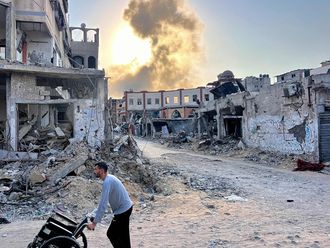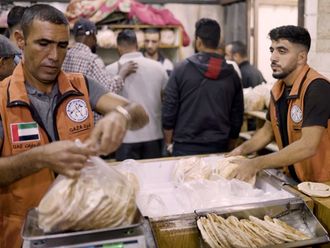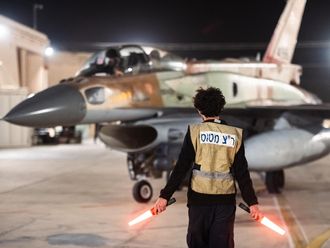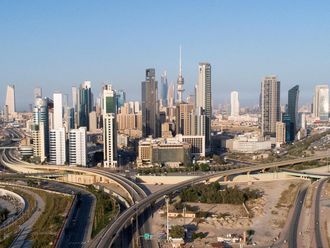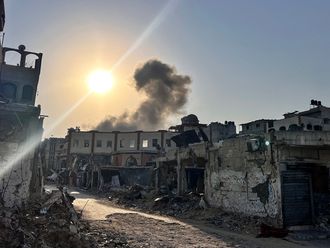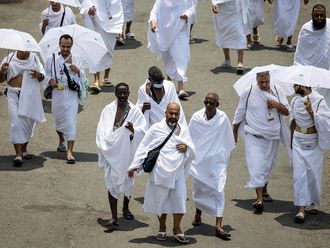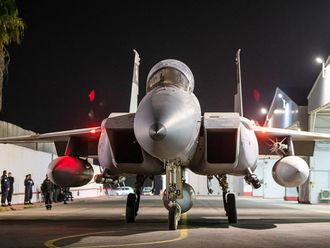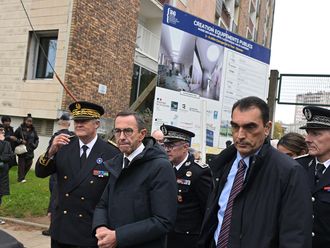Dubai The mood in Dubai's Iranian Club was buoyant as fans gathered around the national football team, asking players to pose for pictures under the watchful gaze of Iran's revolutionary leaders whose pictures adorned the wall.
After a friendly match against Jordan, team members were about to board a bus to take them to the airport for the flight back to Tehran and talking about their prospects for the 2014 World Cup.
"There's so much more confidence," said a bystander in an Iranian football shirt who busily snapped photos with his mobile phone. "I really think we can qualify."
As the bus pulled away, the conversation turned to the state of Iranian politics and the forthcoming parliamentary elections and the atmosphere turned distinctly gloomy.
"These elections are a game to control the people," said Sabor, a 17-year-old Iranian physics student who had lived in the UAE since he was child. "There is no point in people voting because there is no choice." Friday's election will be Iran's first since a presidential vote in 2009, when a disputed victory for President Mahmoud Ahmadinejad triggered eight months of violent protests.
With leading reformist groups staying away from the vote, the contest is between the hardline backers of the Supreme Leader, Ayatollah Ali Khamenei, who hope to capitalise on widespread economic discontent to defeat allies of Ahmadinejad.
Difficulties
At home and abroad many Iranians have experienced the difficulties of life under an unbending Islamic government and have long since given up hope that one day political change will come. The crowd outside the Iranian Club was no exception.
"Tell me who I should vote for," pleaded Jalal, a 54-year-old carpet dealer from north-west Iran on a business trip to Dubai. "There is no choice, no freedom. These candidates are self-serving and are in it for themselves."
Many were reluctant to discuss the situation in Iran — unsurprising given that the club is owned and run by the Iranian government as a cultural institution for the estimated 400,000 Iranian nationals living in the UAE. But Mohammad had brought his wife and two children for the club's weekly buffet lunch and was in a talkative mood. The manufacturing executive said he came from a conservative family that had always avoided politics.
"Our grandparents and our parents used to say, don't get involved in politics because there is no use. There is always a good guy and a bad guy and they end up doing a deal together. And after that no-one can tell who the good guy is."
His wife admitted she had been swept up in the presidential election fever that gripped Iranians in 2009 and cast her vote at a polling station in Dubai. Iranians in UAE can vote in presidential but not parliamentary polls.
"I will never vote again," she said forcefully.
"Like everyone I voted for Mousavi in 2009 and look what happened," she said, referring to the disputed re-election of Ahmadinejad.
There was an overwhelming turnout for the presidential election amongst Iranians in the UAE. In the days that followed hundreds defied the Emirati ban on public demonstrations to join protests against the official results and call for a rerun.
Iranians have flocked to the UAE over the last three decades, looking for a break from the economic and social difficulties back home and to improve their job opportunities or pursue their studies. Many Iranians who have opted to live in Dubai are sharply critical of the Iranian government and believe there needs to be wide-ranging reform.
Not enough choice
"There has never been enough choice," said Mohammad, stepping up his criticism of the Guardian Council, the body that vets candidates for all elections in Iran. "I understand why some candidates are excluded but it's not fair when the government prevents genuine people from standing."
Like many Iranians, Mohammad supported the government's position on nuclear technology, however.
"I'm sure the government isn't after the bomb. What is happening on the nuclear issue is a political game created by the West," he said, as his wife nodded in approval. "It's the same game they played in Iraq [who was accused of hoarding weapons of mass destruction, which were never found]."
In a shop near the Dubai creek, a youthful Iranian trader called Mahdi said he had no idea about or interest in the parliamentary vote. He lived in Dubai for eight months of every year, spending the rest of the time back in Iran.
"Ahmadinejad is a strong man. He says the right things and he goes to many cities and villages across Iran to help the poor."
The 29-year-old also praised Khamenei: "Why should I not like him. Not only is he my leader, he is a leader for all Shiite Muslims." His words were greeted with cheers among fellow shopkeepers.


